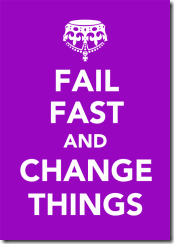If you say “We Fail Fast” mean it
I’ve been in technology on both the IT side of the house and the Development side of the house now for over 15 years. I’ve seen projects, transitions, major efforts, etc fail gloriously, succeed spectacularly, clutch success from certain defat and everything in between.
 There probably is enough material on failures in technology to fill the Library of Congress. Form the why’s and how’s to avoiding failure. But that’s not what I’m going to address.
There probably is enough material on failures in technology to fill the Library of Congress. Form the why’s and how’s to avoiding failure. But that’s not what I’m going to address.
I’ve heard a lot about “Failing Fast”. It’s a lean startup principal and is the foundation for a lot of how bootstrappers work. But I’ve seen it more and more in the agile community as well. Companies pick up the “Fail Fast” mantra and repeat it.
Out of all the companies I’ve seen that say they practice “Failing Fast” very few actually do, why because failing fast is hard, very hard. In the world of startup success is only possible because of failure and lots of failure. Slowly people are realizing that for all the Google’s and Facebook’s success stories there are thousands of failures that they stood upon. But for all the good that can come out of failure (I’ve always said I learn far more from my failures then my successes) there are some very real bad parts to it.
First off there is a very real emotional consequence to failure, it sucks, it hurts and it makes you feel like crap. Your ego get’s bruised and you start to question a lot of things, a deep level of critical introspection is never fun. Secondly there is the expenditure of capital (it can be money, reputation, favors or even political capital) that was expended on the failed endeavor that may never be recovered. Next you have the wasted time, resources, brain power and goodwill that all take a hit. If you’ve had 5 people working full time on a project for 6 months, that is a lot of time and effort that they pumped into something that nothing may be salvageable.
Nobody wants to back a failure, especially when they were responsible for pitching or proposing it in the first place. Their ego is on the line when that happens, and it obviously will have an impact on decisions and ongoing evaluation. Finally we all believe at our core that we can accomplish anything, meet any goal or be the single person that can save a project. We all want to be the hero, and how better to be one then to save that ailing project single handily.
Failure can come in many forms, it could be a failure to deliver, failure to deliver on time and on budget or that success just cost too much in the way of relationships, lost personnel, feelings and other items that are hidden from the balance sheet. So yes, even your success could be a failure if you look a little deeper.
So with everything stacked against failure is it any wonder we rarely see a fast failure, especially one with any magnitude? We’ve all done spikes, tested a market and decided “Nah, not going to work” but those are easy and cheep failures. What about a system re-write, where it requires a team months to just get the ball rolling? Do you just call it quits at the first obstacle?
It’s easy when a project fails due to one big cut. The problem that just take the head clean off. You can look at it and say “We failed because of this one big thing and maybe a bunch of smaller ones”. But what about the failure due to a thousand paper cuts? Our tendency is to find a solution, put a band aid on the cut, and keep moving, we end up doing that so much and so often that we forget about all the cuts until it’s too late. This is where “Failing Fast” comes into play, stopping the endeavor before you’ve bleed out.
But it’s hard, you feel like you can’t go to your boss or stakeholders and say “This project is failing because of these little issue”. Their response will be “well those are minor and we can work around them, a new design, reduced requirements, more resources, etc”. But resist the urge to throw ‘more’ at it and analyze why and how it’s starting to fail. It’s easier to do 3 months into a large project, then a year in.
I always have a bottle of Macallan 10 on standby for my big failures, it helps with the emotional aspect.